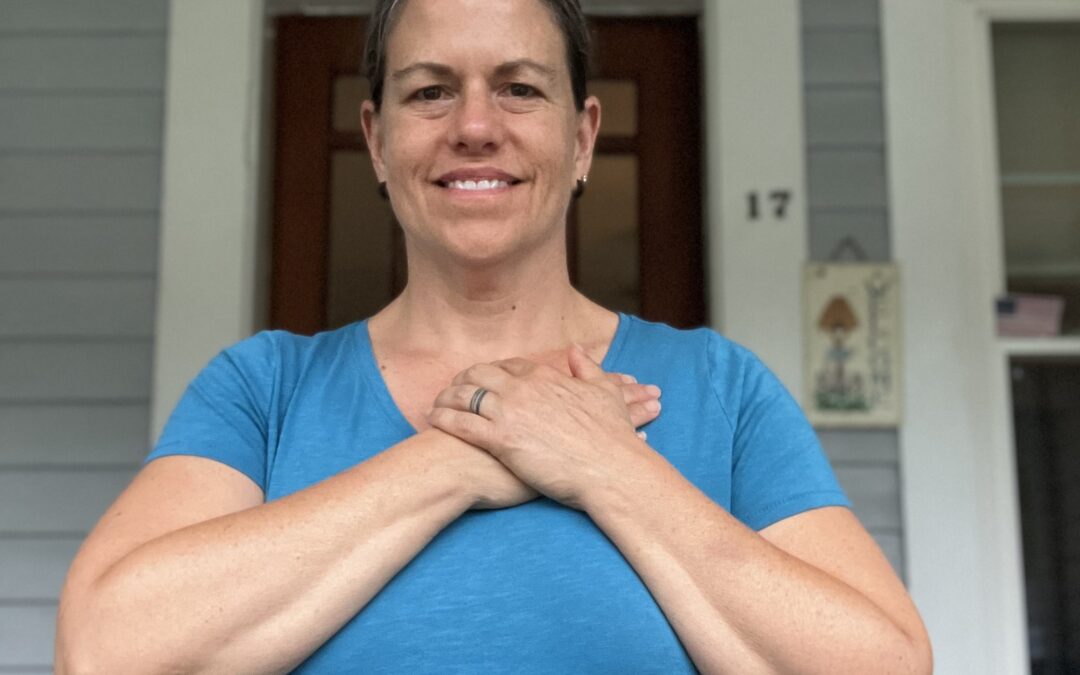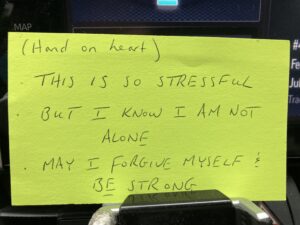Do any of these phrases sound familiar? “I can’t meditate- my mind just won’t be quiet.” “My favorite jeans don’t fit anymore. I am so weak to give into my food cravings.” “I need to rearrange my schedule to attend my friend’s party even though I don’t want to go- otherwise she’ll be disappointed in me.” Or, “I used to be a speedy runner- now I am so frustrated about not being able to keep up that I don’t even want to try.” What are the stories you are telling yourself about your worth and abilities? Do you beat yourself up when you “fall off the wagon” or do you give yourself grace and keep going?
I have a difficult time experiencing disappointment, especially the feeling of letting someone else down. In college, I forgot to drive a roommate to the airport. Thirty-two years later, I can still remember how upset I was with myself! When I am involved with any conflict, thoughts of self-dissatisfaction ruminate in my mind, for a long time. Yet, if any one of my friends were in the same position, I would encourage, validate, and point out all the reasons they should be kind to themselves. In fact, my friends really do encourage me in all those ways so why can’t I cut myself some slack? Healthy boundaries, intrinsic motivation, self-efficacy, and our self-identity all start with self-compassion.
Kristen Neff, PH. D (author of Self-compassion and Fierce Self-compassion) developed the concept of self-compassion in three aspects: Mindfulness, common humanity, and self-kindness. Think about what the experience of compassion feels like. To have compassion for anyone, you must first notice their suffering. Get curious and listen to the thoughts repeating in your head. The word compassion literally means to “suffer with.” Having compassion means that you offer understanding and kindness when someone fails or makes mistakes, rather than judging them harshly. Finally, when you connect from your heart, you realize that suffering, failure, and imperfection are part of the shared human experience. You are not alone!
It is rewarding to pursue challenging goals with a sense of determination but when they come from a place of shame or self-hatred, they are difficult to sustain. If we don’t truly believe we are worthy of care, we won’t be able to prioritize our well-being. When you are noticing negative self-talk about your body, missed opportunities, or unhealthy habits, this practice will help you remember the three aspects of self-compassion for a sense of peace, love, and the foundation to move forward. I keep an index card in my car and in my purse for moments when I need it most. Use whatever words speak to your heart.
Self-compassion practice-
- “This is a moment of suffering” (Mindfulness) Other options include: “This hurts” or “This is stressful”
- “Suffering is a part of life.” (Common humanity) Other options include: “Other people feel this way, I’m not alone.” “We all struggle in our lives.”
Now, put your hands over your heart, feel the warmth of your hands and the gentle touch of your hands on your chest. Or adopt a comforting touch that feels right for you.
- “May I be kind to myself” (Self-kindness) What do I need to hear in the moment to express kindness to myself?
“May I give myself the compassion that I need.” “May I learn to accept myself as I am.” “May I forgive myself and be strong”
If you are having trouble finding the right words, imagine a dear friend or loved one had a similar difficulty. What would you say to that person? Now see if you can offer the same message to yourself.
Listen to a guided self-compassion practice: https://self-compassion.org/self-compassion-practices/#guided-practices
Curious about your level of self-compassion? Check out Self-compassion.org, to take a brief quiz.
You may choose to establish habits that allow you to be healthy and happy, but this is done because you care about yourself, not because you are worthless or unacceptable as you are. Having compassion for yourself also means that you honor and accept your humanness even if you slip up. Your mind and body deserve all the care you would give someone else!
“Kindness begins with how we treat our own thoughts.” -Gelong Thubten, Buddhist monk and author.
Be Well, Trish



